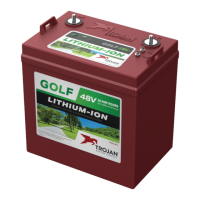TROJAN BATTERY
6
2 SAFETY
ALWAYS NEVER
Always wear proper personal protective equipment (PPE)
(eye protection and gloves).
Never wear jewelry or other metal objects when working on or
around batteries.
Always use insulated tools when working on batteries. Never place objects on top of batteries.
Always check connections for proper torque.
Never charge a battery when the temperature is below 32°F (0°C)
or above 113°F (45°C).
Always keep sparks and flames away from batteries. This includes
sources of static electricity.
Never store batteries below 30% State of Charge.
Always use short cables of appropriate size to minimize
voltage drop.
Never exceed maximum charging currents for the battery’s
temperature.
Always make sure charger is set as recommended.
Never dispose of batteries as household waste. Use recycling
channels in accordance with local, state and federal regulations.
Always charge batteries before installing.
Never connect or disconnect terminals from batteries without first
disconnecting loads.
Always make sure chargers are off or disconnected while working
on batteries.
Never attempt to open the battery case.
Always add additional TR GC2-48-G batteries in parallel.
Never use pressure washers to clean the battery or immerse the
battery in water.
Always use battery lifting strap. Never short-circuit the battery terminals.
Always review product warning labels and
Trojan
®
GC2 48V Lithium-Ion User’s Guide.
Never physically damage the battery (this includes, without
limitation): Puncturing, dropping, crushing, burning, penetrating,
shaking, hammering, and misconnecting terminals.
Always install batteries while powered off. Never lift by the battery terminals.
Never over-charge or over-discharge the battery.
Never attempt to connect TR GC2-48-G batteries in series.
WARNING! RISK OF FIRE, EXPLOSION OR BURNS. DO NOT DISASSEMBLE,
HEAT ABOVE 140°F 60°C OR INCINERATE.
THE MOST EFFECTIVE FIRE EXTINGUISHER TYPES FOR TROJAN LITHIUMION
BATTERIES ARE CO
2
OR WATER. SEE SAFETY INSTRUCTIONS.
Trojan
®
GC2 48V Lithium-Ion batteries are engineered to disconnect from the host system under a variety of
conditions in order to avoid internal damage. When this occurs in equipment using these batteries, all power will
be lost. In certain types of equipment, an abrupt interruption of power can cause undesirable and unexpected
equipment behavior, such as braking loss or sudden braking. The system installer must understand the
consequences of this behavior and ensure that proper system features are in place to avoid potentially harmful
changes in equipment behavior without properly notifying the operator. The system installer assumes all responsibility
and liability for any damages that may occur if these features are not properly implemented. For reference, automatic
safety shutdown modes are described in Section 10.3: “Protection Limits: Automatic Safety Shutdown.”

